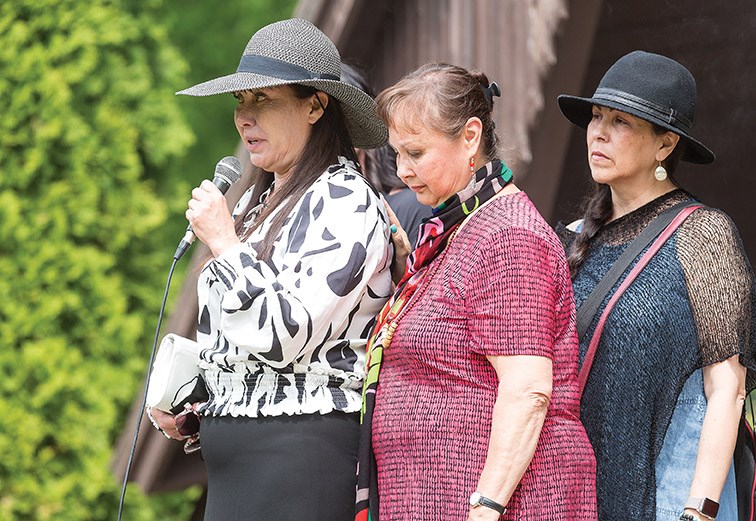Some say there are no words but they are wrong.
There aren't enough words, in all of the languages, existing and forgotten, to convey the enormity of certain moments. Language fails us at the highest and lowest times of human experience but that should never mean we shouldn't try as best we can to speak of what has happened and how we feel about it.
In the case of the skeletal remains of 215 children discovered at the site of the Kamloops residential school, we must bear witness. We must confront this atrocity. We must offer comfort. We must listen.
To Chief Dolleen Logan, band and council, youth and elders, and all Lheidli T'enneh people near and far, we are sorry. Please accept our deepest sympathy. We can't imagine the sorrow and hurt and rage you must be feeling, triggered by this tragedy. We know many of your people were taken from their families and sent to Lejac and that trauma runs through the generations, an open wound that haunts you to this day. The school is gone but the suffering goes on.
To all Indigenous peoples in our community and across the province and country, we offer our apologies and our condolences. We hear you and we are listening. We want to be with you, in whatever manner you decide is the best way to honour and recognize your 215 children.
Let us be precise with the language - they were not lost. They were stolen from you by us, by the settlers, the cruellest of the many thefts you have endured over the centuries since first contact.
A few years ago, the skeletal remains of 12 people were discovered in Lheidli T'enneh Memorial Park during construction of the new pavilion. Some elders and others wanted a fuller story told. There were archeological reports made for each individual but they were not released.
"I think to me and to the community, I think it would be best to leave it where it is," Dominic Frederick, then chief of the Lheidli T'enneh, said at the time. "I think there's been enough digging around and bringing up the past and stirring the pot and that sort of thing and we don't want that to happen."
The Citizen filed an appeal to the Information and Privacy Commissioner for those reports. In hindsight, that was a terrible mistake. Despite our desire to support the members of the Lheidli community who told us they wanted to see those reports, we did not respect the difficult choice made by Chief Frederick and band council. The good intentions of well-meaning settlers to decide what is best for Indigenous peoples has caused far too much pain and hardship for far too long. For that, we sincerely apologize.
Finally, let this moment be the time when non-Indigenous Canadian society accepts two words: settler and genocide.
If you are a non-Indigneous Canadian, you are a settler on stolen lands and every living non-Indigenous Canadian continues to benefit from that theft. Accepting that reality and showing kindness and respect to Indigenous peoples costs non-Indigenous people nothing but basic human decency. As settlers, we can never undo what was done by those who came before us but let's start by simply being better.
From there, let us accept the stain of genocide at the heart of Canadian history. For more than 100 years, First Nations children were forcibly removed from their homes and their communities to be sent to institutions where they endured physical, sexual and emotional abuse in a concerted effort condoned by the federal government to wipe out Indigenous culture, languages and traditions.
Some Canadians grudgingly call this "cultural genocide" and invoke the Holocaust, Cambodia and Rwanda as "real" genocide, except that the United Nations definition of the word makes no distinction between the butchering of an identifiable group of people and the violent eradication of their heritage. Both are genocide without qualification. Intent and action, not body count, are the legal measurements for genocide.
These truths should make all Canadian settlers uncomfortable but continuing to embrace the lies embedded in Canadian history is worse because it passes the responsibility of reckoning and reconciliation down to our own children and their children.
For them and for the 215 children in Kamloops and for the thousands of other Indigenous children who died in residential schools, let's now use our words and then our deeds to do what's right, for their sake.



